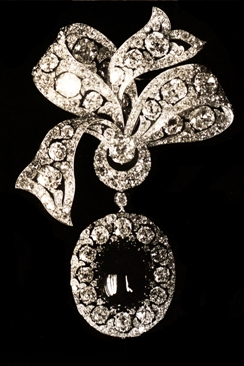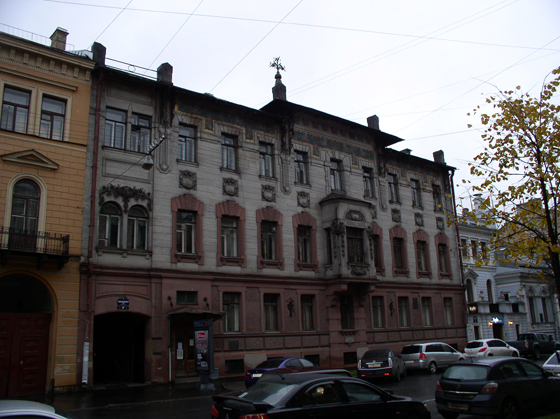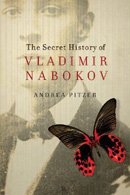posted by Andrea Pitzer on Jan 03 2013
Filed In: Intermediate
In Vladimir Nabokov’s 1962 novel Pale Fire, hidden crown jewels haunt the narrator, Charles Kinbote. The mad, self-absorbed Kinbote believes himself to be the exiled king of Zembla, a northern ruler overthrown by a Soviet-style neighbor. Throughout the book, Kinbote references agents searching the Zemblan castle for missing jewels, but the treasures never turn up, and Kinbote is sure they are so well hidden they never will be found.
 A half-century later, readers and critics are still arguing over the meaning and importance of Pale Fire‘s crown jewels. Are they the key to a secret understanding of the novel, or a red herring to baffle literalists who would strip the book of its magic? Nabokov himself encouraged (or taunted) the literalists—years after the book’s publication, he was still dropping hints about the location of the missing gems.
A half-century later, readers and critics are still arguing over the meaning and importance of Pale Fire‘s crown jewels. Are they the key to a secret understanding of the novel, or a red herring to baffle literalists who would strip the book of its magic? Nabokov himself encouraged (or taunted) the literalists—years after the book’s publication, he was still dropping hints about the location of the missing gems.
Exploring the fate of those jewels in detail, The Secret History of Vladimir Nabokov offers a solution to their mystery. But only recently did I learn from the U.S. Geological Survey that the real-world Russian crown jewels, with their own mysterious past, have begun to pose new riddles, too.
In writing about crown jewels, the Russian-born Nabokov was not operating in a historical vacuum; he was playing off the attraction and fame of Imperial treasure. The Russian crown jewels were an extraordinary assortment of royal wealth at its most ostentatious. Formally organized under Peter the Great in the 18th century, the collection belonged to the Empire itself, with each subsequent ruler adding to the national trove, which was eventually housed in the Diamond Room of the Winter Palace in St. Petersburg.
Read more ›
posted by Andrea Pitzer on Jan 01 2013
Filed In: News
This week we’re rolling out several new pages on the site (the other part of “we” being the design superpowers of Mackenzie McCluer). You’ll see posts running on this home page, with everything from basic Nabokov background information to guest pieces and new historical tidbits about the man and his century.
I’m classifying the posts on this page into four categories: News, Beginner, Intermediate, and Advanced. NEWS will cover new information about the book. BEGINNER and INTERMEDIATE will be posts for those interested in reading more about Nabokov and/or the 20th-century history that shaped his life. Soon, for those visitors already addicted to Nabokov, I’ll start including posts in the LEXICAL MADNESS category, which takes its title from a Michael Wood review. This category will be devoted to wandering farther into the odd crevices and ideas of Nabokov’s work.
Also new today are the items on the crimson navigation bar near the top of each page. More information about The Secret History (and me!) can be found, surprisingly enough, on the BOOK and AUTHOR pages respectively.
 Upcoming March book signings and readings in Manhattan and DC are posted on the EVENTS page, with more dates and cities coming soon. (I’m particularly excited about speaking at a program of the 92nd Street Y as part of their lunchtime Tribeca series, not only because the Y has such an amazing history in American arts and letters but also because Nabokov himself did a reading at the Y in April 1964.)
Upcoming March book signings and readings in Manhattan and DC are posted on the EVENTS page, with more dates and cities coming soon. (I’m particularly excited about speaking at a program of the 92nd Street Y as part of their lunchtime Tribeca series, not only because the Y has such an amazing history in American arts and letters but also because Nabokov himself did a reading at the Y in April 1964.)
Information on reaching my publisher, Pegasus Books, and myself is on the CONTACT page, and in the next few days, the BIBLIOGRAPHY page will go live. Eventually, in the spirit of Nabokovian playfulness, we’ll roll out an assortment of games and other amusements on the DIVERSIONS page. And once the book is out, portions of declassified intelligence files and other material not under copyright will be posted in the RECORDS section. Read more ›
posted by Andrea Pitzer on Dec 31 2012
Filed In: Beginner
Why focus on Nabokov? And why now? These are questions I’ve been asked by everyone from prospective publishers to strangers who have heard I’m writing a book.
Because there was no shortage of drama in his life, stories about Nabokov have endless potential. He fled the aftermath of the Russian Revolution with Bolsheviks firing machine guns as his ship pulled away from shore. He lived in Nazi Germany with his Jewish wife and son before escaping to Paris, only to find himself trapped in France well into the beginning of World War II—just weeks, in fact, before the country fell to Hitler. He went on to write Lolita, one of the most scandalous yet popular books of the century.
But why do a book about Nabokov? Not only did he write his own stellar memoir twice in English and once in Russian, but his life and writing have been explored by more than one biographer with access to troves of information. He achieved fame well before he died. His literary accomplishments were so extraordinary that his brilliant helpmeet wife Véra merited a biography of her own. It’s not as if his work is in danger of falling into minor-author status, or he himself has been forgotten. What is there to say that hasn’t been said?
 The Nabokov family home, 47 Bolshaya Morskaya
The Nabokov family home, 47 Bolshaya Morskaya
St. Petersburg, Russia, October 2011The simplest answer is that Nabokov’s most famous novels present mysteries that have haunted and obsessed readers for decades. These mysteries are sometimes touted as literary enigmas without solutions, but they have plausible answers that can be found by rediscovering the world in which Nabokov lived.
Read more ›
 A half-century later, readers and critics are still arguing over the meaning and importance of Pale Fire‘s crown jewels. Are they the key to a secret understanding of the novel, or a red herring to baffle literalists who would strip the book of its magic? Nabokov himself encouraged (or taunted) the literalists—years after the book’s publication, he was still dropping hints about the location of the missing gems.
A half-century later, readers and critics are still arguing over the meaning and importance of Pale Fire‘s crown jewels. Are they the key to a secret understanding of the novel, or a red herring to baffle literalists who would strip the book of its magic? Nabokov himself encouraged (or taunted) the literalists—years after the book’s publication, he was still dropping hints about the location of the missing gems.

